Mike Saulters's blog
Review: Ender's Game
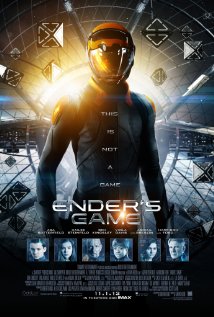
Opening this weekend, Ender's Game represents something of a puzzle. The movie is based on a novel considered by many to be the greatest work of science fiction ever written, but authored by Orson Scott Card, controversial as a homophobic contributor to the anti-gay marriage movement. Many people have vowed to boycott the film because of Card's views, but Ender's Game is a story that deserves to be told.
It was a bold move to put such a sizable production for such an important story into the hands of Gavin Hood, director of the much maligned X-Men Origins: Wolverine. The resulting film, however, does manage to hit the important points of an extensive story while failing to completely do it justice.
The premise is a future Earth that has survived an alien invasion through the heroics of one exceptional leader. Seventy years later, the government is seeking a new leader for an attack force who has the ability to understand the enemy and the genius to defeat them.
Children are considered the only viable candidates, and Andrew "Ender" Wiggin (Asa Butterfield) represents the greatest hope for success. Leading his training is Colonel Graff (Harrison Ford), who has some unconventional ideas about instruction. Vilified for being smarter and more successful than his peers, Ender is manipulated by Graff into being emotionally detached from his classmates in order to make him a better leader.
Watching the movie Ender's Game, I had a feeling that never occurred as I read the book -- that it vaguely resembles the Harry Potter books. Ender is no orphan, but is separated from his family. He's everyone's hope for victory, and he's the star player of zero-gravity quidditch. This is likely the result of adapting an involved novel into only 114 minutes. A story that takes place over four years is compressed into little more than a few months. Sweeping plotlines from the source are abandoned, and what remains must be calculated to sell (and therefore pleasantly omits the anti-gay slurs found in Card's book).
Review: The Counselor
 The Counselor is dirty, very very dirty, sexy-dirty. Beginning with Michael Fassbender and Penelope Cruz in bed, to Cameron Diaz being as carnally, carnivorously slutty as you've never seen her before to Javier Bardem's jaw-dropping monologue describing a night with her, this is a pressure cooker of a film, exploding with steam.
The Counselor is dirty, very very dirty, sexy-dirty. Beginning with Michael Fassbender and Penelope Cruz in bed, to Cameron Diaz being as carnally, carnivorously slutty as you've never seen her before to Javier Bardem's jaw-dropping monologue describing a night with her, this is a pressure cooker of a film, exploding with steam.
It's also a bemusing piece that challenges actors to play a little outside their established roles. Brad Pitt is not the hero but a little bit of a coward, Fassbender's character is directionless, entirely at a loss for what he should do ... and how often is Javier Bardem a sympathetic good guy?
Writer Cormac McCarthy (No Country for Old Men) is at home in west Texas, but director Ridley Scott makes El Paso look a little more glamorous and busy than it really is. (Only pick-up footage was actually shot there, though.)
The story involves Fassbender, credited only as "Counselor" and never called by name, an attorney who has gotten into debt to a criminal element and goes into business with Reiner (Bardem) and Westray (Pitt) in the hopes of making millions selling drugs through a club he and Reiner plan to open. In a murky plot that becomes only slightly more clear by the end, a third party arranges to kill a key player and steal the drug shipment, leaving Counselor holding the bag.
It is clear that, like the actors, McCarthy was trying to stretch himself and achieve something great with The Counselor. He succeeded, at least, in creating something remarkably unique. Rambling philosophical diatribes from supporting actors create a thoughtful mood but don't ultimately have a clear meaning, their delivery at times reminiscent of David Carradine's lines in Kill Bill.
In spite of the death of his brother and producing partner Tony mid-shoot, Ridley Scott has done a great job assembling a phenomenal cast and directing a noteworthy film that will be worth revisiting and may perhaps gain some cult status.
Cinema Touching Disability Film Fest Celebrates its Tenth Year

The Coalition of Texans with Disabilities (CTD) hosts its tenth annual Cinema Touching Disability Film Festival and Short Film Competition this November 1 and 2 at the Alamo Drafthouse Village.
The Cinema Touching Disability Film Festival was founded in 2004 by CTD staffer William Greer, with the goal to counter negative stereotypes about people with disabilities and to celebrate positive portrayals of disability culture. Since its inception, the festival has twice been awarded the Barbara Jordan Media Award for Special Contribution by an Organization.
Events from previous years have included a 2005 screening of What's Eating Gilbert Grape preceded by an interview with star Darlene Cates, an exclusive interview with Dr. Temple Grandin screened in conjunction with the 2009 feature Temple Grandin, and numerous other special guests.
You can buy tickets now for Friday, November 1 featuring the documentary Getting Up: The TEMPT ONE Story -- about graffiti artist Tempt One -- and for Saturday, November 2 featuring The Crash Reel -- a documentary about professional snowboarders. In addition to entry, the $10 tickets are vouchers you can redeem for $10 of food and drink from the Drafthouse menu. Both evening events also include short films from the competition and Q&As.
Polari 2013 Dispatch: A Quartet of Films
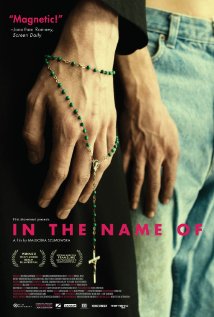 The best of the films I saw last weekend at Polari 2013 was on Saturday afternoon. Polish writer-director Malgorzata Szumowska explores the feelings of a gay priest working in a school for troubled youths in the poignant film In the Name Of.
The best of the films I saw last weekend at Polari 2013 was on Saturday afternoon. Polish writer-director Malgorzata Szumowska explores the feelings of a gay priest working in a school for troubled youths in the poignant film In the Name Of.
Trapped by the requirements of his faith with nobody to whom he can turn for a human connection, Adam (Andrzej Chyra, who bears a strong resemblance to Daniel Craig) longs only for the comfort of human embrace. A good man who always has a positive influence on his charges, Adam never does anything wrong, though almost completely unfounded accusations repeatedly result in his transfer to other parishes.
Szumowska peels back the stoic exterior to reveal the depths of longing and loneliness suffered by a man striving to set the highest example of godliness and the tragic unfairness that can result from unfounded suspicions. In the Name Of is a moving bittersweet story that treated a delicate subject fairly but with tenderness.
While most of the Polari screenings were downtown, Friday night brought a detour to the Marchesa to take in a screening co-sponsored by the Austin Film Society.
Animals is a Spanish film by director Marçal Forés about a troubled teen dealing with feelings for a new classmate with a dark secret. In a failure of mood over substance, the film is beautiful to look at, with an attractive cast acting against the mountains of northern Spain but following an aimless story with little payoff.
Forés oversells the teen angst in an attempt to establish a feeling akin to Donnie Darko and then fails to follow up on numerous hints of deeper backstory to which he has alluded. There is no clear motivation in Animals for just about anything any of the characters do including -- and especially -- a tasteless display of school violence.
Unfortunately, on Saturday I caught the most boring movie I have ever seen. Shot in Austin, Pit Stop -- directed by Yen Tan, who co-wrote with Dallas filmmaker David Lowery -- stars Bill Heck, Marcus DeAnda and Amy Seimetz in two stories of heartbroken men who converge when they meet for a sex date arranged online. Nothing ever happens to indicate why these two might be right for each other. They don't appear to have much in common, and neither displays any appreciable personality.
Polari 2013 Dispatch: Five Dances

The first day of Polari (formerly aGLIFF) happened to coincide with the birthday of the Paramount theater last night.
Opening night found a nearly full house at Stateside Theatre for Alan Brown's award-winning Five Dances. First, however, creative director Curran Nault took the stage to open the fest and along with interim executive director Aaron Yeats and board Vice President Paul Soileau (aka Rebecca Havemayer, aka Christeene), reminisced on the contributions aGLIFF founder Scott Dinger. They announced that henceforth the festival's audience award will be officially known as the Scott Dinger Audience Award.
Five Dances is a sultry, sexy meditation on familiar themes of a rural boy coming to terms with his sexuality after leaving home for the city. Set to a soundtrack rich with cello by Private Romeo composer Nicholas Wright, and interspersed with crooning jazz tunes by Scott Matthew, Gem Club and Perfume Genius, five young attractive supremely talented modern dancers practice and perform a composition in five movements by choreographer Jonah Bokaer as Brown's camera lingers, capturing every form, every curve, the subtle shadows cast by every muscle.
Fantastic Fest Review: The Congress
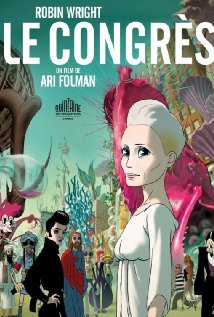
My favorite selection from Fantastic Fest 2013 combines the best aspects of all genres represented at the fest. It is a powerful science fiction story with an element of horror in biting social commentary played out in a half real, half animated Bakshi-esque environment. Loosely adapted by director Ari Folman from the Stanislaw Lem novel The Futurological Congress, The Congress expands on the story set down by Lem in a production of which he would likely approve.
Robin Wright won a Fantastic Features best actress award at the fest for her role as Robin Wright, a fictional version of herself who is encouraged by her agent Al (Harvey Keitel) to sell her digital likeness to the studios. In exchange for a small fortune that will allow her to spend her life with her ailing son Aaron (Kodi Smit-McPhee), she can never perform again even in something as small as a church play.
Wanting to maintain the illusion of control, she consents to a 20-year contract with stipulations that her likeness would not be performing in various kinds of roles to which she would object. Unable at first to get comfortable with the scanning apparatus, Robin displays the full range of her emotions as Al relates a story to her that is alternately happy and heartbreaking. Perhaps as a result, at the end of her contract 20 years later, the studio (cleverly called "Miramount") is pushing for a renewal as her digital image has become the most popular actor in their stable.
This is where the story in The Congress more closely resembles Lem's novel, as Robin travels to the "animated zone" to meet and sign her new contract. A chemical cocktail alters her perceptions, and the world takes on a look as if it were animated by Tex Avery, Max Fleischer, Moebius, and Ralph Bakshi in a shared dream. Desert sands assume psychedelic colors, planes undulate like lazily-swimming whales -- in an aquarium, penis-fish swim around while others have mouths resembling vaginas sucking the glass like algae-eaters.
After a lifetime of making bad choices, Robin still seems to be making them, and she is plunged into a situation that may forever separate her from her family. The Congress spells out thematically a powerful update to Lem's commentary on the role of drugs in modern society and adds to it some statements on the monetization of Hollywood as well as making a critical point about the short attention span of modern audiences. Demonstrating the horror that can lay behind "truth" and the vast loneliness inherent in hiding within a world of dreams and fantasy, Folman presents a world that is simultaneously utopian and dystopian, where actors are reduced to a chemical commodity that can be eaten or drunk, and a shared hallucination allows anyone to be anyone or anything they desire.
Review: Runner Runner
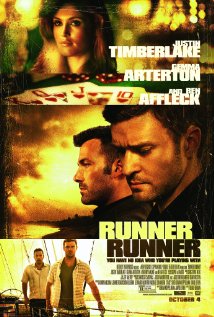
Runner Runner is an enjoyable by-the-numbers tale of doublecross directed by Brad Furman (The Lincoln Lawyer). Scripted by Rounders and Ocean's 13 writers Brian Koppelman and David Levien, it stars Justin Timberlake as Richie Furst, a Princeton whiz-kid who gets in over his head when he travels to Costa Rica to confront Ivan Block (Ben Affleck), the online poker mogul who cheated him out of his college tuition.
Rounding out the cast are Gemma Arterton as Block's bewitching business manager/ex-girlfriend, and Anthony Mackie as the FBI agent pressuring Richie to turn informant.
Furman shoots from a handheld point of view with a narrow focus that makes the movie feel a little smaller than the lavish playboy surroundings where most of it takes place. The shaky-cam does little to liven up Affleck's wooden performance, which seems designed to prove his talents are best used behind the camera. At first jovial then progressively cruel, Block never expresses any emotions outside the range of Affleck's Dazed and Confused role as Fred O'Bannion.
Timberlake, on the other hand, is born to play the down-on-his-luck golden boy. Relying on charisma, luck, and being just enough smarter than the other guy, his Richie is not far removed from his previous lead role as Will Salas in 2011's In Time, which at least had enough action and special effects to make it a more memorable film.
And that is the unfortunate bottom line for Runner Runner. The unusual title refers to a poker term for drawing two cards to make a winning hand, or in other words, being extremely lucky. The movie is fun, it's brief at only 91 minutes ... and unfortunately it's unmemorable as anything but a minor vehicle for one star with the power to rate a better script and another with the cachet to direct his own efforts.
Fantastic Fest Review: We Gotta Get Out of This Place
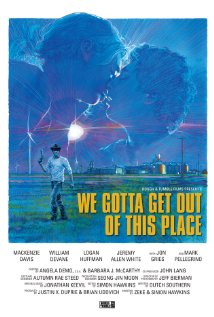 We Gotta Get Out of This Place was shot in Taft and Corpus Christi, Texas, during winter months where endless dead cotton fields perfectly represent the inescapable bleak feelings suffered by small-town high-school students on the cusp of starting new adult lives. Playing something like a more mature version of Something Wicked This Way Comes minus the supernatural element, writer Dutch Southern's screenplay inserts a maliciously scheming petty criminal father-figure into a teenage love triangle, with deadly results.
We Gotta Get Out of This Place was shot in Taft and Corpus Christi, Texas, during winter months where endless dead cotton fields perfectly represent the inescapable bleak feelings suffered by small-town high-school students on the cusp of starting new adult lives. Playing something like a more mature version of Something Wicked This Way Comes minus the supernatural element, writer Dutch Southern's screenplay inserts a maliciously scheming petty criminal father-figure into a teenage love triangle, with deadly results.
Mark Pellegrino (Dexter, Lost) has a career packed with dark roles, but Giff is a unique character. The rural mafia boss is uneducated but possesses a devastating crafty intelligence. Perhaps slightly insane, he is predatory, with a charming, even seductive personality that reveals his vicious intent with the punchline of his never-ending one liners. He employs teens B.J. (Logan Huffman) and Bobby (Jeremy Allen White), whom he coerces into working a heist for him to repay a small fortune that B.J. has stolen and then blown in a weekend of partying with Bobby and girlfriend Sue (Mackenzie Davis).
Like Pellegrino, the other leads in this movie are cast true to type. Best known for his role in the ABC reboot of V, Huffman's portrayal of B.J. is a Jim Nightshade analogue. With no prospects for college as a way out of town, he embraces Giff as a mentor and the only hope of finding success. He realizes too late that he is in over his head.
Jeremy Allen White's Bobby, like the light-haired Will Halloway, is more heroic, but his better education and plans to attend college with B.J.'s girlfriend Sue result in a growing feeling of alienation between the lifelong friends. Feelings of betrayal become deadly, and they could all pay the price.
Fantastic Fest Review: Gravity
 "State of the art" is described on Wikipedia as "the highest level of development of a device, technique, or scientific field, achieved at a particular time." Ever so rarely, a film appears that advances the state of the art in filmmaking to the next level, becoming a benchmark by which other films are judged.
"State of the art" is described on Wikipedia as "the highest level of development of a device, technique, or scientific field, achieved at a particular time." Ever so rarely, a film appears that advances the state of the art in filmmaking to the next level, becoming a benchmark by which other films are judged.
Recently (at least since the late 80s) this has been James Cameron's playground, as a string of blockbusters like The Abyss, Terminator 2, Titanic and Avatar all set new standards for the use of computer graphics in filmmaking. Of course, Steven Spielberg also joined him in the sandbox with Jurassic Park.
Now Alfonso Cuaron's heavily-anticipated Gravity sets a bar so high one could say without irony that it's in orbit. After more than two decades of computer-generated wonders in film, it is difficult to impress an audience that is already quite used to seeing every wonder a director can imagine. Computer-powered dinosaurs, spaceships, cars and robots make a trip to the cinema feel like stepping into The Matrix, but one thing that anyone with a lot of experience with video games can tell you is the processing power required increases exponentially as you add more objects to a scene. CG can do one object brilliantly. Various tricks allow Peter Jackson to create an army controlled by swarming algorithms or the zombies of World War Z to flow like water.
But there are shots in Gravity that prompt one to exclaim "God Himself made this film!" Thousands, tens of thousands, maybe hundreds of thousands of objects crash into each other, ricochet, and break apart -- all while looking so detailed, so perfect, and each independently travelling along its own path.
Fantastic Fest 2013: A Quartet of Capsule Reviews
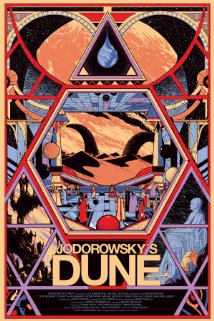 The programming at Fantastic Fest this year has proven to be the most diverse, balanced, and engaging in its nine-year history. The broad appeal of the selections resulted in a positive response for even the weaker choices. If the highest goal to which festival programmers can aspire is to bring to light great films, the work this year was a complete success.
The programming at Fantastic Fest this year has proven to be the most diverse, balanced, and engaging in its nine-year history. The broad appeal of the selections resulted in a positive response for even the weaker choices. If the highest goal to which festival programmers can aspire is to bring to light great films, the work this year was a complete success.
It's impressive that one of the weakest films I saw this week is one many are actually calling Ti West's best film to date. His fourth feature, The Sacrament, is shot documentary-style as a pair of Vice reporters (AJ Bowen and Joe Swanberg) follow a man on the search for his sister that takes him to a Jonestown-like compound.
West has created a modern-day recreation of Jonestown that distills elements of the real thing into a tense feature. The look of his set closely matches photos of the compound. Even Jones's declining health is mirrored in the character "Father," portrayed ironically by actor Gene Jones. AJ Bowen lands most of the screen time here and will earn new fans with his dynamic performance as the reporter Sam. Swanberg is rarely seen as his role takes him behind the documentary camera, and Kentucker Audley, as the third member of the trio, is absent for the majority of the movie. His sister Caroline is Bowen and Swanberg's You're Next costar Amy Seimetz.
Unconvincing dialogue and extended takes made me find myself wishing someone would remind writer/director Ti West to yell "Cut," so it fails to top The Innkeepers as my personal favorite of his films.
Stephen Chow is one of the hottest filmmakers in China and no stranger to genre audiences with hits like Shaolin Soccer and Kung Fu Hustle. With Journey to the West: Conquering the Demons, Chow exponentially increases the hilarity and artistry of his craft. Unlike his previous works, Chow remains behind the camera for this one, and the result is a more coherent narrative with the same energy and amazing action you expect but more focused on a linear story progression. This appears to also be Chow's first period piece, allowing him to play with sets, costumes, and creature design that start at "spectacular" and increase from there.

